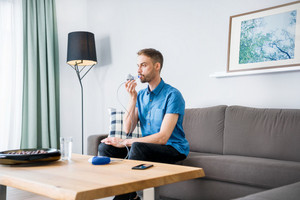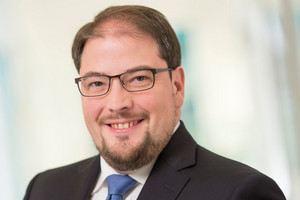Dr Ulrich Zißler works as a researcher at the German Center for Lung Research in Munich. He has successfully dedicated his career to the research of allergic diseases and allergen-specific immune therapy. He himself also suffers from cystic fibrosis (CF). He discusses what has changed in his therapy in terms of inhalation since he started on CFTR modulators.

Dr Zißler: Thanks to my physiotherapists, ever since I was a child I have always had a very good sense of what is going on in my body and am aware of acute changes related to my cystic fibrosis. I have always made a point of making sure I get the ideal level of therapy. If I did not, I noticed my health deteriorate very quickly.
Otherwise, it is hard work and you need an iron discipline to manage this disease – I always call it my “day job”. Inhalation therapy and physiological movement combined with a PEP system and a flutter are very important tools. Using them means you can cough up the mucus and avoid atelectasis.
Despite having a full-time job as a researcher, I stick to my daily therapy conscientiously. It takes up several hours of my time every day. This allows me to keep the number of exacerbations as low as possible.
Dr Zißler: The introduction of the CFTR modulators has only changed my therapy in the sense that I now only inhale antibiotics when needed, in addition to taking oral antibiotics. I can manage minor infections better now, and am getting them slightly less often.
Dr Zißler: This therapy is essential for my survival as the mucus otherwise thickens, even with CFTR modulators – although not to the same extent it used to before the modulator therapy. In any case, I find antibiotics very valuable for infections of the airways. This allows me to prevent viral illnesses from being exacerbated by bacterial infections at an early stage.

Dr Zißler: I see inhalation with hypertonic saline solution as my daily “walk on the beach”. Hypertonic solution means that the secretion is not as thick and I can relatively effectively and productively cough it up.
I also need the therapy to “listen to my body” and localise the mucus. That way, I can target my breathing to that spot. That doesn’t completely stop my condition from getting worse, but I can quickly recognise if I am developing CF-related airway complications and can act to fight them off.

Dr Zißler: I have carried on the physiotherapy as before because the CFTR modulators do nothing to change the skeletomuscular problems associated with CF. The muscle tension that has built up over the course of my life is not completely reversible. This is why chest mobilisation is still an important part of my therapy.
You can strengthen your airways with activities such as playing a wind instrument (in my case the French horn) and yoga, but there is always going to be an interplay between the different elements that I try to integrate into my daily life.
Dr Zißler: When I started taking the modulator therapy I did a test on myself and reduced the therapy with hypertonic saline solution down to once instead of twice a day. But I have never stopped it altogether. And while I did not get an infection during that fortnight, my mucus was thicker and there was more of it. At least the colour changed and switched from dark yellowish green to light yellow. Then I increased the frequency of my therapy again to my own normal level. That way I could get back to my own normal.

Dr Zißler: I usually make acute decisions on my own, but I do later closely discuss them with the outpatient department. It also often helps to get an expert’s view from outside and to discuss how they see the situation. I discuss the medication and any extra tests with the team at the CF centre treating me, as is the case for any check-ups.
If I read or hear something about new treatment options or treatment strategies, I openly talk to them about it. Then I can hear the pros and cons from the professionals. Even if I initially disagree with the team treating me, I am persuaded by strong arguments. But that also applies the other way round.
Dr Zißler: That is a definite no. Every percentage point I lose I see as a loss of quality of life and life expectancy. I stick to regular inhalation with hypertonic saline solution; the interval between antibiotic inhalation therapy can be lengthened slightly in agreement with the outpatient department, e.g. when the weather is warm. But if necessary, the antibiotics can be used at a shorter interval in consultation with the physiotherapists and doctors to prevent a deterioration. The therapy is part of my life; my wife has always accepted that. It has also been just part of normal life for our son too.
Even if I could save an hour of nebuliser therapy a day plus the preparation time for disinfection and so on, it would only be a short-term saving. The time and effort needed to recover again once my condition deteriorated would be much greater. I do my therapy conscientiously for myself but also for my family - my antibiotic therapy depends on need and I do not stick to any strict intervals.
Dr Zißler: Apps do have an important part to play in monitoring my illness. They not only give me an overview of the data, but I can also send the information to my doctors so that they can make decisions fast. As our entire lives have become, to some extent, digitalised, the treatment of cystic fibrosis will change fundamentally in this way in the next few years too.
Especially when it comes to data about therapy and vital parameters, recording data with apps will play an important role in the future. Therapy recommendations could then be based on this data that could, for instance, be released to the doctor.

Dr Zißler: For the doctors it is, I believe, important to see us patients as individuals and not look at us as deviations from a text book. The disease develops differently in each patient – so the focus of the treatment and individual treatment regimen should be based on this.
Here, both the doctors and we as patients should take a critical approach and work together to find the best option for the patient that takes up the least possible time. But the therapy is always going to be a mental strain on the patient, especially for adolescents and young adults. Here doctors need to be sensitive to guide the patient towards the best possible level of therapy.
It is not helpful for patients and puts them under even more pressure if the doctor threatens with the consequences. That may end up with the patient refusing to do the therapy. For us patients it is important, I believe, to talk to the doctors clearly and openly to establish common ground. If the doctors do not know the patient’s opinion, they cannot make any appropriate recommendations.
Communication must go both ways, not just one way. If patients disagree with a therapy suggestion or do not understand it, they should talk to their doctor about it and explain their thoughts - the doctor cannot read your mind!
You also have to clearly and openly express how far you are willing to go as a patient, so that the limits of how much you can cope with are defined. Ultimately we are all responsible for our own health. Doctors can only guide us along the way – we always have to go on the journey ourselves.
And to conclude with the words of Freddie Mercury, which sums up my motto for life pretty well: „Your life is your own, You’re in charge of yourself, Master of your home, In the end, in the end, You have to face it all alone.”
Note: The statements made in the interview are individual assessments of a patient with medical expertise. They do not necessarily reflect the general state of science. In the same way, the described use of inhaled antibiotics does not necessarily correspond to the approval of inhaled antibiotics.
An article written by the PARI BLOG editorial team.
© 2025 PARI GmbH Spezialisten für effektive Inhalation